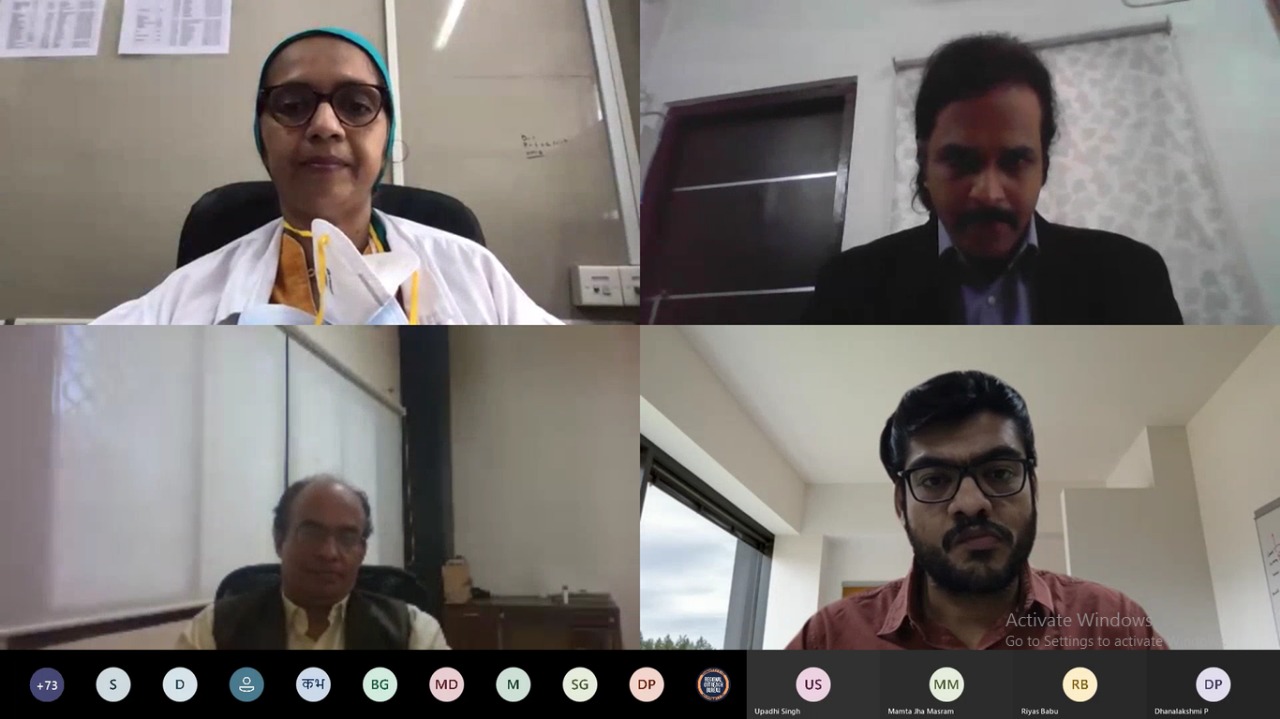Ministry of Information & Broadcasting
West Zone, Ministry of I&B organizes National Doctors’ Day Webinar on COVID-19: Myths and Realities
Follow precautions, don’t believe rumours, spread hope, lend support to healthcare warriors and to each other: message from doctors on Doctors’ Day
Posted On:
01 JUL 2020 4:15PM by PIB Mumbai
Mumbai, July 1, 2020
“The invincible medical warriors are going to triumph over the invisible virus”. The National Doctors’ Day webinar on COVID-19 – Myths and Reality, organized today by Press Information Bureau, Western Region and Regional Outreach Bureau, Maharashtra and Goa Region, began on this positive note. Manish Desai, Director General, Ministry of Information and Broadcasting, West Zone, was recalling the inspiring words of Prime Minister Shri Narendra Modi. The two doctors on COVID duty who addressed the webinar threw light on various aspects of the disease, including myths and realities, and also disease-related communication aimed at benefitting and empowering the masses to fight the virus and keep themselves safe during the pandemic. Dr. Ishwar Zanwar, Consultant and Interventional Cardiologist, Pune Hospital and Dr. Henal Shah, Head of Psychiatry and In-charge, HR and Logistics for COVID-19, Nair Hospital, Mumbai interacted with the participants in the webinar. The webinar was attended by around 100 officials and staff of various departments under the Ministry of Information & Broadcasting, including Press Information Bureau, Regional Outreach Bureau, All India Radio, Doordarshan and Films Division.

Dr. Zanwar explained that the COVID-19 virus has been a “super spreader” about which “we are learning everyday”. He clearly stated that it spreads from person to person through respiratory droplets and that there is no proven efficacious drug against it till date and also that only ancillary treatments are being provided till now. Hence, he cautioned, “We should not be complacent thinking that vaccines and drugs are on the way” and urged people to follow the government and ICMR’s guidelines on wearing masks, maintaining a 6 feet distance, handwashing and so on. Busting some of the common myths associated with the virus, Dr. Zanwar spelled out the realities concerning those. Like washing hands with soap and water or using an alcohol-based sanitizer cannot be substituted by blow drying or using UV disinfection lamps. He also said that receiving a package from China will not surely lead to contracting the virus and that vaccine against pneumonia cannot prevent coronavirus. About pets at home spreading the virus, he said, there has been no evidence to prove that pets like cats or dogs can be infected with this virus, though it is advisable to wash hands with soap after contact with them to prevent bacteria like Salmonella or E.coli that can pass on from them. Again, having garlic, rinsing nose with saline water or applying sesame oil also is not any proven method to keep away the virus.
Speaking on the progress in the battle against SARS-COV2, Dr. Zanwar opined in an optimistic tone that mankind has tamed deadlier viruses like measles, small pox, polio etc. in the past and thus, cure for coronavirus will also be coming soon. The presentation given by Dr. Zanwar can be accessed here.
Dr. Henal Shah said, “Social media panic travels faster than the virus”. Speaking about several misinformation and sensationalizing news that have been visible since the start of the pandemic, Dr. Shah opined, role of media in health communication is to prevent misinformation and communicate preventive measures to keep safe. She said, language of reporting should not create fear, shame, guilt. The fear of spreading the virus brings with it stigma that makes people suppress their symptoms and desist from consulting a doctor. About media and communication roles which are vital to fight the associated infodemic, she said, it should empower people with the right knowledge about what is to be done. About endorsing information published or broadcasted, she said, “We have to distinguish between what is sensationalized and what is helpful”.
Sharing her experiences of working in a COVID Hospital and that of doctors on COVID duty, Dr. Shah said, “One was not prepared for the pandemic. We all had to make a quick jump.” The health infrastructure also underwent a series of changes within a short while. Stating the instance of Nair Hospital where Dr. Shah is attached, didn’t have so many oxygen beds earlier. Now, oxygen support is being given to 1043 patients who are undergoing treatment for COVID-19. Speaking about doctors, she further said, doctors from different disciplines are now on COVID duty, irrespective of their field of specialization. Whether or not they had training to treat and handle a pandemic disease, they all were pulled in for this one purpose of COVID-19. “All doctors are working out of their specialization and comfort areas, which also adds to the stress”, she said.
Speaking about the anxieties and fears that confront doctors, Dr. Shah said, they remain worried about passing on the virus to their family members. Along with the doctors, their families have also been pulled in this war against coronavirus. Then, there is a constant uncertainty as this is a new virus having no definitive cure till now, which adds to their worries. Working in shifts takes a toll on health which again causes stress. Further, doctors have to always keep themselves abreast of new treatment protocols, researches, best practices worldwide and also at a local level. Resident doctors have their examinations knocking at the door, which causes worry as being on COVID duty, they are getting little time for preparations. Then to top it all, they are having to witness deaths despite everything they do, which can be very demotivating, said Dr. Shah.
Speaking about the stigma that doctors were subjected to, Dr Shah said, society responds to stigma with violence. Then again, some of their neighbours are always trying to keep their spirits high in such uncertain times.
Some of her colleague doctors have fallen prey to the virus. But they returned to duty as soon as they were cured, informs Dr. Shah.
About expectations of the medical community, Dr Shah said, “We are hoping that there will be more focus on health infrastructure and health professionals in the post COVID-19 days, so that we are better prepared to deal with such diseases in the future”. The presentation given by Dr. Shah can be accessed here.
In reply to a question on the significance of six-minute walking test, Dr Zanwar said, it is a test only to segregate the patients on basis of severity and cannot be a replacement for RT-PCR test.
In the context of how health communications should be modelled in Unlock 2 phase, Dr Shah said, now the war against corona has gone from the hands of the health professionals to the community. Hence, following, government and ICMR’s prescribed guidelines is now the community’s responsibility, which should be the mainstay of related communications now.
Dr. Shah also opined, media and communication should reflect a sense of hope and optimism along with evidence-based communication.
About the psychological impact of COVID-19 on aged people, Dr Shah said, elderly people should be encouraged to remain connected through social media.
About taking immunity boosters, Dr. Zanwar said, while it is good to have immunity boosting ingredients, we should not confuse these as preventive measures against COVID-19 which happen to be wearing masks, hand washing, maintaining physical distancing.
In his inaugural address, the Director General recalled famous doctors of our country like Anandi Gopal Joshi, Dwarkanath Kotnis, Bidhan Chandra Roy who continue to command people’s respect for their noble service to mankind. Paying his tribute to the doctors, he said that if we are in our own midst, it is because of no one but our doctors and healthcare corona warriors. “When the world is going through the COVID1-19 pandemic, these doctors are the frontline corona warriors in the long-drawn battle against coronavirus.” Speaking about the Centre’s pre-emptive, pro-active and graded approach to fight the virus, he said: “The Centre has been closely cooperating with states and local bodies. The state success stories are being shared by the Centre with other states as well, so that success stories can be replicated. The fight against COVID-19 has been responded by employing an integrated strategy. Today, Dharavi has become a successful model which is being studied across the country and internationally as well. For example, Brazil is interested in knowing how the success can be replicated in Sao Paolo.” The DG also highlighted the importance of evidence-based communication to bridge our knowledge gaps and for greater empathy in public communication.
The Vote of Thanks was delivered by Santosh Ajmera, Director, ROB Pune, who highlighted the importance of public communication in winning the battle against COVID-19.
***
DJM/SC
Follow us on social media:  @PIBMumbai
@PIBMumbai  /PIBMumbai
/PIBMumbai  /pibmumbai
/pibmumbai  pibmumbai[at]gmail[dot]com
pibmumbai[at]gmail[dot]com
(Release ID: 1635646)
Visitor Counter : 559